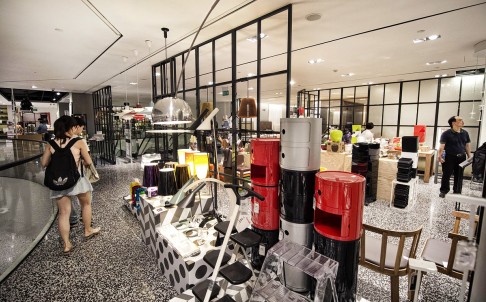The not-so-Great Singapore Sale: Mainland shoppers say Hong Kong is better value
Mainland Chinese shoppers discover how a strong dollar, labour costs and a sales tax in the city state mean it's cheaper to go to Hong Kong
PUBLISHED : Tuesday, 05 August, 2014, 3:25am
UPDATED : Tuesday, 05 August, 2014, 4:18pm
Bloomberg in Singapore

Shoppers walk through Robinsons department store in Singapore, where prices are 10 per cent higher than in Hong Kong. Photo: Bloomberg
Retailers billed it as the Great Singapore Sale. Chinese tourist Zhu Liang bought into it, only to regret it afterwards.
"We will never come here again to shop on purpose," said Zhu, a 35-year-old businessman from Hangzhou. Visiting the city during the final days of the summer sale season in July, he bought a Loewe handbag for his wife, only to discover he could have paid less in Hong Kong.
Behind the mark-up: a strengthening exchange rate, rising labour costs and a sales tax mainland tourists do not encounter in neighbouring Hong Kong. A reduction in visitors from Asia's largest economy contributed to a sales slide of as much as 4 per cent in Singapore's annual shopping festival, according to the retailers' association.

Visitors from China to Singapore dropped 27 per cent in the five months to May from a year earlier amid slower economic growth on the mainland and the impact of a new Chinese law that clamped down on cut-price shopping tours. Total tourist arrivals declined 1.7 per cent, according to the Singapore Tourism Board.
Singapore's retailers, already facing growing regional competition, are under the most pressure since the Asian financial crisis, Singapore Retailers Association honorary treasurer Kesri Singh Kapur said.
"It is that grim," Kapur said. "Both sides of consumption, which are the domestic customers and tourists, are not spending. I anticipate that at least for the next 12 months, the market will be sluggish."
While Beijing's anti-corruption campaign against extravagant spending by government officials and state-owned companies has also dampened spending on the mainland and in Hong Kong, retailers in Singapore are grappling with the threat of a broader decline in appeal.
Singapore's average retail sales growth dwindled to less than 1 per cent in the two years to May, according to government data that excludes motor vehicles. In Hong Kong, the average was 6.9 per cent in the 24 months to June.
Singapore has seen its currency strengthen about 3 per cent against mainland China's yuan in the past year, the most after the Korean won among major Asian currencies. The Hong Kong dollar has gained 0.9 per cent.
"If we change our renminbi to Hong Kong dollar, it seems like we have a huge amount of money. With Singapore dollar, you just feel like it is a little money," Zhu said as he walked empty handed out of the Paragon mall on Orchard Road with his family. Singapore retail goods are about 10 per cent more expensive than in Hong Kong, he said.
Singapore imposes a 7 per cent goods and services tax. While tourists can claim back part of that on departure, "there is still a differential of 2 to 3 per cent", said Kapur, who is also Asia head of Dubai-based Al-Futtaim Group, the operator of retail chains such as Royal Sporting House, Marks & Spencer and Robinsons department store in Singapore.
International tourists including those from China, Indonesia and India account for at least 20 per cent of Singapore retail sales, with Chinese accounting for about half of that, Kapur estimates.
Tourism Board data show Chinese visitors spent S$800 million (HK$4.97 billion) in Singapore in the first quarter, of which almost half was on shopping.
Retail brands have expanded into other markets in China, Indonesia and Malaysia, making Singapore a less unique shopping destination, said Kapur.
"Singapore had this aura and advantage of being slightly different from its neighbours" five or 10 years back, he said. "Yes we have a great Orchard Road, we have a great environment where people can walk and shop, but availability of brands has come at parity now."
